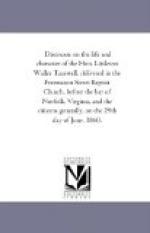He declined a reelection to Congress, and came to Norfolk in 1802, then a place of extensive foreign commerce, and soon entered upon a large and important practice. During the same year he married a daughter of the late Col. Nivison, and from that time to the present continued to reside among us. With the exception of the interrupting years of the war of 1813-14, and of a short period, during which he represented this city in the Legislature on a special occasion, he practised his profession with the honor and success that were to have been expected from one who was, while yet a young man, pronounced by Judge Marshall and Judge Roane to be unsurpassed, if equalled, by any competitor of his day. It was indeed hard to speak in measured terms of a lawyer who, though a resident of a provincial town, was consulted, at the same time, (1819,) by London merchants on the “custom of London,” and by the priests of Rome on the canon law.
At the earnest solicitation of Mr. Monroe, he reluctantly accepted the appointment of one of the commissioners under the Florida treaty,—being united in that duty with Mr. King and the late Hugh Lawson White; and after that work was done, he withdrew from the practice of law to the privacy which he so much, perhaps too much, loved.
In 1825 he was elected by the General Assembly a Senator of the United States over some distinguished competitors, and soon after taking his seat was called upon to discuss the celebrated Piracy bill of Mr. Monroe’s administration; and in a speech on that measure, which he defeated, displayed such extraordinary resources of argument and learning as threw all his associates of that epoch in the shade, and established his own reputation as the greatest debater of his age.
He was a prominent member of the Convention of Virginia in 1829-30, where his compeers were Chief Justice Marshall, John Randolph, Watkins Leigh, Taylor, Upshur, and others of that brilliant assembly. He was at the same time a Senator from Virginia in Congress; and was in nothing behind the great personages of the Senate, where sat Calhoun, Clay, and Webster, save only in his invincible desire and love of retirement.
In 1833-4 he resigned his seat in the Senate of the United States, and soon after, and almost without his knowledge, he was elected Governor of Virginia, the duties of which office he actively and faithfully performed until his resignation, which took place before the expiration of his term.
From that time he has continued in private life—but not uselessly, for he has been consulted from all parts of the Union on almost all subjects; and by his intimate acquaintances, his opinions have been regarded as oracular inspirations. He has also attended with care to his private duties, and these, with his correspondence, have chiefly occupied his later years.




